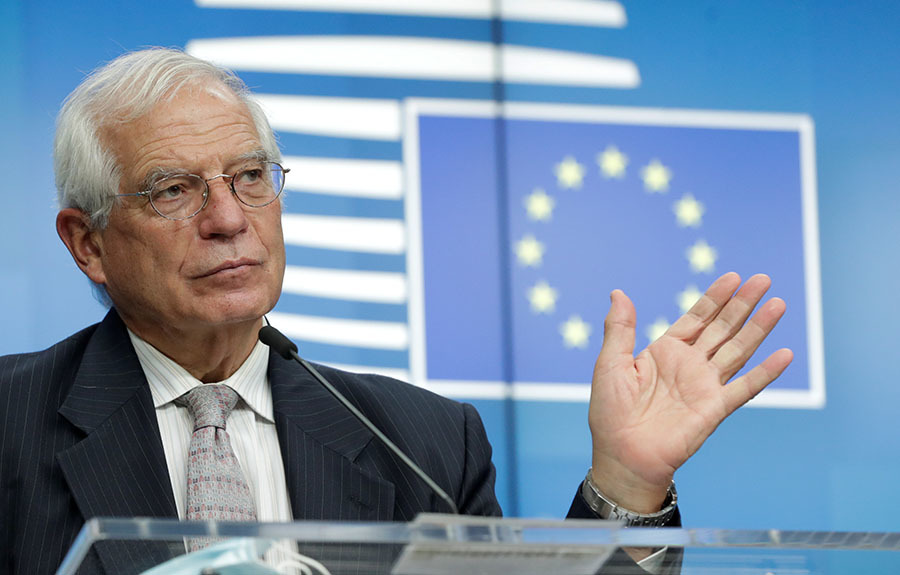The foreign ministers of the European Union countries could not agree on a sanctions list for Belarus, said the head of European diplomacy Josep Borrell.
According to him, European leaders will consider this issue again during the September 24-25 summit.
“For this issue, we need a unanimous decision, and now there was no unanimity in the hall,” Borrell commented on the outcome of the discussion of sanctions against Minsk.
His words are quoted by RIA Novosti.
At the same time, the head of European diplomacy later said that the issue of sanctions against Belarus was not on the agenda due to "lack of unanimity."
He explained that a number of representatives of European states are not ready to discuss restrictions against Minsk until the previously proposed sanctions against other countries are approved.
Along with this, Borrell said that European diplomats also do not have a single position regarding sanctions against President of Belarus Alexander Lukashenko.
Head of European Diplomacy Josep Borrell
Reuters
© Olivier Hoslet
“This is still under discussion.
This is a matter of tactics; there is a certain step-by-step approach to the issue of sanctions.
Some believe that Lukashenka should be included in the list, others should not.
There is no agreement at the moment, ”Borrell explained.
The European diplomat also expressed the opinion that "the situation in Belarus continues to deteriorate."
He mentioned that the leaders of the foreign ministries of the EU countries did not recognize Lukashenko as the legitimate leader of the country and called for new elections for the head of the Belarusian state.
Borrell said that according to available data in Europe, "the elections were rigged."
“We supported the Belarusian people, their aspiration for democracy, as well as their call for new fair elections under the auspices of the OSCE.
The EU's goal is free elections in Belarus, ”Borrell believes.
At the same time, the head of European diplomacy said that the European Union does not intend to interfere in the affairs of Belarus.
“We have no hidden interests, we have no desire to interfere in the internal affairs of the country, we just want to support the Belarusian people who are striving for free elections,” Borrell says.
Let us recall that on August 9, presidential elections were held in Belarus.
The current head of state, Alexander Lukashenko, won them with 80.1% of voters.
After the publication of the preliminary results of the elections in Belarus, large-scale protests began.
The protesters demanded Lukashenka's resignation from the post of head of state and new elections.
Earlier, the Russian Foreign Ministry called on the EU countries to reconsider the current course of interaction with Belarus, since the current approach of the European Union prevents the normalization of the situation in the country.
In a statement published by Russian diplomats, it was said that "the rate on the replacement of the current government through sanctions, pressure and propaganda is increasingly anchored in the foreign policy arsenal of the European Union."
Konstantin Blokhin, a researcher at the Center for Security Studies of the Russian Academy of Sciences, believes that statements about non-interference are often heard from representatives of Western states, but in fact the policy of intervention continues and deepens.
“It is clear that if the opposition succeeds in changing the regime in Belarus, then a huge cordon sanitaire will stretch from the Baltic to the Black Sea, which will isolate Russia from Europe with a belt of states hostile to Russia,” Blokhin suggested.
Professor of the Department of Comparative Political Science of the RUDN University Yuri Pochta believes that Europe has its own idea of non-interference in the affairs of sovereign states.
“When Europeans talk about the idea of non-interference in the internal affairs of other countries, it is about the fact that other countries should not interfere in their affairs and the affairs of those countries that are of interest to Europeans.
The situation is the same with the United States, ”the expert said.
At the same time, the Post suggested that the EU did not have enough motives and reasons to impose sanctions against Belarus.
“A number of European countries do not recognize the election results, but there are no exact quantitative indicators,” the expert noted.

